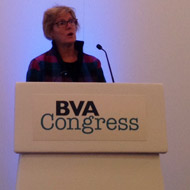
"We have been misusing antibiotics as patients, as doctors and in food production," says Chief Medical Officer at BVA Congress
In her introduction, Professor Dame Sally Davies, Chief Medical Officer & Chief Scientific Adviser for the Department of Health, pointed out that antibiotic resistance is already a deadly reality for humans, with mortality levels equivalent to deaths from road traffic accidents. There are over 25,000 deaths annually in Europe and resistant strains of bacteria are readily spread through much wider global travel.
She pointed out that one of the problems is the paucity of antibiotic development, so we must look after those antibiotics that are currently available.
Although there is a need to have good surveillance data and to improve prescribing and dispensing at all levels of the human health sector; there is also a need for the veterinary profession to put its own house in order, she added.
Statistics on the use of antibiotics in animals show that, on a worldwide basis, there is still a very high level of use in feeds and medicated water.
"We have been misusing antibiotics as patients, as doctors and in food production'" said Dame Sally. "Our strategy is to turn the tide in both human and veterinary medicine."
She advocated restricting the use of fluoroquinolones and cephalosporins in veterinary medicine, and only after proper sensitivity testing to ensure there are no alternatives available. Early and accurate diagnosis of specific causes of infection is paramount and attention to animal husbandry, management and husbandry.
Closing her presentation, Dame Sally reminded her audience of the recent European Antibiotic Awareness Day and the concurrent launch of the Antibiotic Guardian Campaign. "Think like a clinician, become an antibiotic guardian," she said.
There were several points made in response to this lecture. Dr Christophe Buhot, FVE president, reminded delegates that antibiotic resistance is not a new phenomenon – resistant strains of bacteria have been found in mammoths which were around long before antibiotics were administered!
Dr Buhot spoke of two main concerns. In Denmark, where antibiotic usage in livestock was banned many years ago; while resistance from livestock has decreased, resistance in strains isolated from humans has remained the same or increased. Why?
Why are sales of antibiotics on the Internet being encouraged by the EU authorities?
In response to the statement from a delegate that cheap food puts pressure on farmers to use antibiotics, Dame Sally suggested that we probably have reached the point at which food prices should be raised in line with production costs."That might also help reduce the problem of obesity," she said.
It is vital for vets and doctors in practice to "hold hands" and give the same messages about antibiotic usage respectively to their clients and patients.
There is some evidence that there is transfer of resistance between animals and humans; but there is a lack of comprehensive data. "The main driver for the generation of resistant strains in humans is the misuse of antibiotics in human patients," concluded Dame Sally.



 Joanne Webster, a professor of parasitic diseases at the RVC, has been elected as a Fellow of the Royal Society (FRS).
Joanne Webster, a professor of parasitic diseases at the RVC, has been elected as a Fellow of the Royal Society (FRS).